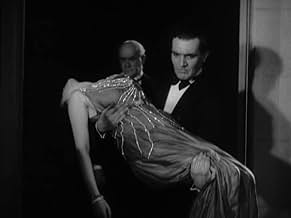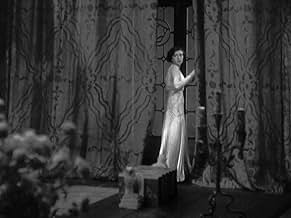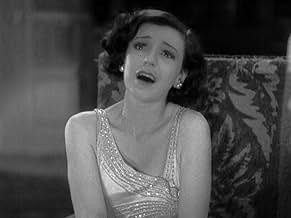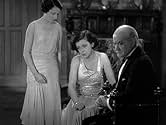IMDb-BEWERTUNG
5,7/10
3810
IHRE BEWERTUNG
Eine traditionell lebende Familie und eine moderne Familie kämpfen in einem kleinen englischen Dorf um Land und zerstören sich fast gegenseitig.Eine traditionell lebende Familie und eine moderne Familie kämpfen in einem kleinen englischen Dorf um Land und zerstören sich fast gegenseitig.Eine traditionell lebende Familie und eine moderne Familie kämpfen in einem kleinen englischen Dorf um Land und zerstören sich fast gegenseitig.
- Regie
- Drehbuch
- Hauptbesetzung
Rodney Ackland
- Man at Auction
- (Nicht genannt)
Ivor Barnard
- Man at Auction
- (Nicht genannt)
Wally Patch
- Van Driver
- (Nicht genannt)
Empfohlene Bewertungen
"The Skin Game" is not exactly classic Hitchcock-- no one could dispute that. But I still think it does not entirely deserve its bad ratings. There are a few--not too many, but a few-- interesting scenes and surprises. The characters are fairly sympathetic and well-drawn.
I think the fault of "The Skin Game" lies not in the fact that it is a stage-bound play-- Hitchcock worked wonders on screen with stage-bound plays, notably "Rope" and "Dial M for Murder". Perhaps it is that the emotions of the characters are not focused upon-- the camera keeps rather too distant. If the tone were more personal in this film, the performers might have a better chance to hold our interest.
If you are looking for entertainment and stimulation that one can normally find in a Hitchcock-- better to look somewhere else.
I think the fault of "The Skin Game" lies not in the fact that it is a stage-bound play-- Hitchcock worked wonders on screen with stage-bound plays, notably "Rope" and "Dial M for Murder". Perhaps it is that the emotions of the characters are not focused upon-- the camera keeps rather too distant. If the tone were more personal in this film, the performers might have a better chance to hold our interest.
If you are looking for entertainment and stimulation that one can normally find in a Hitchcock-- better to look somewhere else.
I recently saw Hitchcock's "Rich and Strange" and really enjoyed it, so I was game for another go at this early 1930's British cinema, in my attempt to become a "Hitchcock completist." Please keep in mind that I'm an American with a pretty-good ear for British dialog, but there are some speeches contained here that I couldn't understand in the least. But only a fairly small portion that is. The early sound equipment doesn't help either.
The title "The Skin Game" refers to a heated altercation that leaves no holds barred, and no prisoners taken. The plot line is essentially a "Hatfields and McCoys" family feud over land rights, with a lot of dirt being dug up on both families involved. Like pretty much all early sound films, there is a heavy reliance on dialog and the spoken phrase, which makes "The Skin Game" obviously derived from the stage.
At the beginning there's a long take with probably ten pages of dialog in it, using a medium shot of three characters, with the camera panning between them. At least once, someone was speaking dialog while not on camera, which I always find distracting -- a minor flaw I admit, but noticeable. Hitchcock's pacing feels relatively quick considering, and he keeps interest in these scenes with dramatic exits and entrances of characters, and revelations of plot details.
Really some of these takes were so long that actors coughed, dropped things and retrieved them, and other apparent flubs that were never re-shot. Seems like once the director was five minutes into a scene he couldn't afford the film stock to begin again, so there are a lot of miscues and such, which kind of adds to the immediacy. Especially considering that I'm certain that even the young Hitchcock was keenly aware of every missed cue and dropped line, and it had to drive him to distraction! I was certainly impressed by this early Hitchcock effort and I'm sure that audiences back then went away from this one with the feeling that they got their money's worth. It was apparent that an extremely talented film maker was at work here, trying to keep the audience involved every step of the way. And he did succeed actually.
For instance, there is a scene at an auction house that lasts for about ten minutes, and Hitchcock sets it up in such a way to keep the audience anxiously awaiting the outcome. He has the camera making very fast pans from one bidder to the next, slowing down only when the bidding does. The audience has some background information about the proceedings, but not enough to spoil the surprise at the end.
It's early sound cinema -- so most viewers today can't bear this kind of thing, but if you're familiar with and enjoy films of the early 20Th Century, it's extremely enjoyable and does have a payoff at the end! *** out of *****
The title "The Skin Game" refers to a heated altercation that leaves no holds barred, and no prisoners taken. The plot line is essentially a "Hatfields and McCoys" family feud over land rights, with a lot of dirt being dug up on both families involved. Like pretty much all early sound films, there is a heavy reliance on dialog and the spoken phrase, which makes "The Skin Game" obviously derived from the stage.
At the beginning there's a long take with probably ten pages of dialog in it, using a medium shot of three characters, with the camera panning between them. At least once, someone was speaking dialog while not on camera, which I always find distracting -- a minor flaw I admit, but noticeable. Hitchcock's pacing feels relatively quick considering, and he keeps interest in these scenes with dramatic exits and entrances of characters, and revelations of plot details.
Really some of these takes were so long that actors coughed, dropped things and retrieved them, and other apparent flubs that were never re-shot. Seems like once the director was five minutes into a scene he couldn't afford the film stock to begin again, so there are a lot of miscues and such, which kind of adds to the immediacy. Especially considering that I'm certain that even the young Hitchcock was keenly aware of every missed cue and dropped line, and it had to drive him to distraction! I was certainly impressed by this early Hitchcock effort and I'm sure that audiences back then went away from this one with the feeling that they got their money's worth. It was apparent that an extremely talented film maker was at work here, trying to keep the audience involved every step of the way. And he did succeed actually.
For instance, there is a scene at an auction house that lasts for about ten minutes, and Hitchcock sets it up in such a way to keep the audience anxiously awaiting the outcome. He has the camera making very fast pans from one bidder to the next, slowing down only when the bidding does. The audience has some background information about the proceedings, but not enough to spoil the surprise at the end.
It's early sound cinema -- so most viewers today can't bear this kind of thing, but if you're familiar with and enjoy films of the early 20Th Century, it's extremely enjoyable and does have a payoff at the end! *** out of *****
The early 30s were a time of experimentation for Hitchcock, with theme as much as with technique. After discovering that the crime thriller was his forte with Blackmail and Murder!, his at the time zigzagging career lead him to attempt a talkie drama adapted from a fairly mediocre stage play concerning a feud between the families of an aristocrat and an entrepreneur.
In attempting a straight ahead drama without any major thriller elements, Hitchcock nevertheless employs all the techniques he had been perfecting in his earlier crime pictures dynamic editing, a focus on the psychology of guilt and fear, as well as some of the sound techniques of his previous talkies. Sometimes it works, other times it doesn't. He tries to inject some tension into an auction scene with whip pans and quick editing, which is a fairly good display of technique but we don't really care enough about the outcome of the bidding to get really drawn in at this point.
For some of the more talky scenes, Hitchcock tries to move beyond the story's theatrical roots by focusing on reactions and having dialogue take place off screen. This helps to give weight to the second half of the film. In particular, Hitch's dwelling on the face of Chloe, the innocent victim of the feud, makes the audience feel sympathy for her character, which in turn makes the climactic scenes work and prevents them from slipping into ridiculous melodrama (which the stage version may well have done). For some of the more subdued scenes, Hitchcock preserves an unbroken take but still takes the focus on and off different characters by smoothly dollying in and out. This same method would be used by Laurence Olivier when he began directing Shakespeare adaptations in the 1940s. However, too many of the dialogue scenes in The Skin Game are simply a lot of panning as the camera tries to keep up with extravagant theatrical performances.
This is a fairly good go at theatrical drama for Hitchcock, but it was made at a time when he was coming to realise not only his strength in the suspense thriller, but his weakness in (and utter distaste for) every other genre. He was probably beginning to look at this kind of project as a rather dull waste of time, and definitely at odds to his sensibility. As an example, this is one of the very few Hitchcock pictures to take advantage of natural beauty, and yet he makes this aspect a victim of his playful irony, by taking his most beautiful countryside shot, then pulling out to reveal it is merely a tiny picture on a sale poster, surrounded by Hornblower and his cronies laughing over the deal they have just made.
The Skin Game is rarely gripping, but at times it is powerful, and in any case it has a short enough running time to prevent it from getting boring. Hitchcock however was looking now to have more fun with crime and suspense, and this sense of the dramatic (not to mention a sense of genuine sympathy for the victim) would not return until his later Hollywood pictures, and even then only occasionally.
In attempting a straight ahead drama without any major thriller elements, Hitchcock nevertheless employs all the techniques he had been perfecting in his earlier crime pictures dynamic editing, a focus on the psychology of guilt and fear, as well as some of the sound techniques of his previous talkies. Sometimes it works, other times it doesn't. He tries to inject some tension into an auction scene with whip pans and quick editing, which is a fairly good display of technique but we don't really care enough about the outcome of the bidding to get really drawn in at this point.
For some of the more talky scenes, Hitchcock tries to move beyond the story's theatrical roots by focusing on reactions and having dialogue take place off screen. This helps to give weight to the second half of the film. In particular, Hitch's dwelling on the face of Chloe, the innocent victim of the feud, makes the audience feel sympathy for her character, which in turn makes the climactic scenes work and prevents them from slipping into ridiculous melodrama (which the stage version may well have done). For some of the more subdued scenes, Hitchcock preserves an unbroken take but still takes the focus on and off different characters by smoothly dollying in and out. This same method would be used by Laurence Olivier when he began directing Shakespeare adaptations in the 1940s. However, too many of the dialogue scenes in The Skin Game are simply a lot of panning as the camera tries to keep up with extravagant theatrical performances.
This is a fairly good go at theatrical drama for Hitchcock, but it was made at a time when he was coming to realise not only his strength in the suspense thriller, but his weakness in (and utter distaste for) every other genre. He was probably beginning to look at this kind of project as a rather dull waste of time, and definitely at odds to his sensibility. As an example, this is one of the very few Hitchcock pictures to take advantage of natural beauty, and yet he makes this aspect a victim of his playful irony, by taking his most beautiful countryside shot, then pulling out to reveal it is merely a tiny picture on a sale poster, surrounded by Hornblower and his cronies laughing over the deal they have just made.
The Skin Game is rarely gripping, but at times it is powerful, and in any case it has a short enough running time to prevent it from getting boring. Hitchcock however was looking now to have more fun with crime and suspense, and this sense of the dramatic (not to mention a sense of genuine sympathy for the victim) would not return until his later Hollywood pictures, and even then only occasionally.
Early Hitchcock drama that proves with every film, he was experimenting. Here, he uses zip pans moving from person to person during a frantic auction scene. This technique wouldn't become commonplace for another thirty years with the introduction of cinema verite. Other than that, this is a rather ordinary drama.
"The Skin Game" is one of Alfred Hitchcock's earlier sound pictures, and although the story held potential, it is a rather bland film despite a couple of good Hitchcock touches.
The story centers on a rivalry between two neighboring families who have very different views on the future of their community. Mr. Hornblower (Edmund Gwenn) wants to see the land developed and used for factories and businesses, while the Hillcrest family wants to see the traditional homes and countryside preserved. The resulting conflicts hold some real potential, and lead to some good moments as the families try to outwit each other in a "skin game", but the movie as a whole is never really very compelling.
It's hard to pinpoint exactly why this is not a better film. There are no big names in the cast, but Hitchcock made several fine movies with just this sort of cast. Gwenn is good in his role, and Phyllis Konstam is believable and sympathetic as his daughter-in-law whose troubled past eventually provokes a crisis between the two families.
Perhaps Hitchcock stayed too close to the play on which the film is based (it does have a bit of a stage-bound feel), or perhaps for once he did not have a strong sense of the material's potential.
Hitchcock saved his best for the movie's most important scene, when a crucial parcel of land is auctioned off. The auction scene, and a confrontation afterwards between the main characters, is well-done with some good twists.
There are also some nice ironic touches at the end.
Hitchcock fans should still watch "The Skin Game" at least once, to notice the ways that the director's usual touch can be seen, but this movie may not be of much interest to others.
The story centers on a rivalry between two neighboring families who have very different views on the future of their community. Mr. Hornblower (Edmund Gwenn) wants to see the land developed and used for factories and businesses, while the Hillcrest family wants to see the traditional homes and countryside preserved. The resulting conflicts hold some real potential, and lead to some good moments as the families try to outwit each other in a "skin game", but the movie as a whole is never really very compelling.
It's hard to pinpoint exactly why this is not a better film. There are no big names in the cast, but Hitchcock made several fine movies with just this sort of cast. Gwenn is good in his role, and Phyllis Konstam is believable and sympathetic as his daughter-in-law whose troubled past eventually provokes a crisis between the two families.
Perhaps Hitchcock stayed too close to the play on which the film is based (it does have a bit of a stage-bound feel), or perhaps for once he did not have a strong sense of the material's potential.
Hitchcock saved his best for the movie's most important scene, when a crucial parcel of land is auctioned off. The auction scene, and a confrontation afterwards between the main characters, is well-done with some good twists.
There are also some nice ironic touches at the end.
Hitchcock fans should still watch "The Skin Game" at least once, to notice the ways that the director's usual touch can be seen, but this movie may not be of much interest to others.
WUSSTEST DU SCHON:
- WissenswertesThe title comes from a slang phrase for "an unscrupulous business operation". Although this movie is British, the term is considered American and dates back to just after the American Civil War (1861-1865). It is not to be confused with the similar-sounding aphorism "to have skin in the game", which refers to someone who has a stake, financial or emotional, in a business deal, wager, or other situation.
- Zitate
[last lines]
Mr. Hillcrist: What is it that gets loose when you start a fight, and makes you what you think you're not? Begin as you may, it ends in this skin game! Skin game! When we began this fight, we'd clean hands. Are they clean now? What's gentility worth if it can't stand fire?
- VerbindungenFeatured in Paul Merton Looks at Alfred Hitchcock (2009)
- SoundtracksHabanera
(1875) (uncredited)
from "Carmen"
Music by Georges Bizet
Libretto by Henri Meilhac and Ludovic Halévy
Excerpt whistled by Jill Esmond
Top-Auswahl
Melde dich zum Bewerten an und greife auf die Watchlist für personalisierte Empfehlungen zu.
Details
- Erscheinungsdatum
- Herkunftsland
- Sprache
- Auch bekannt als
- The Skin Game
- Drehorte
- Elstree Studios, Borehamwood, Hertfordshire, England, Vereinigtes Königreich(Studio, destroyed during World War II and later rebuilt)
- Produktionsfirma
- Weitere beteiligte Unternehmen bei IMDbPro anzeigen
- Laufzeit1 Stunde 25 Minuten
- Farbe
Zu dieser Seite beitragen
Bearbeitung vorschlagen oder fehlenden Inhalt hinzufügen

































